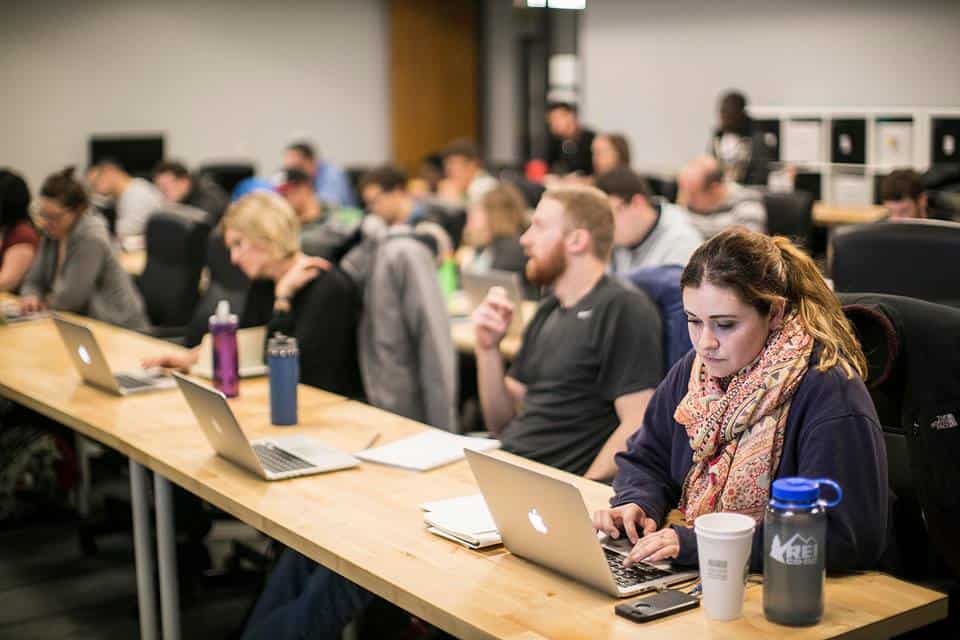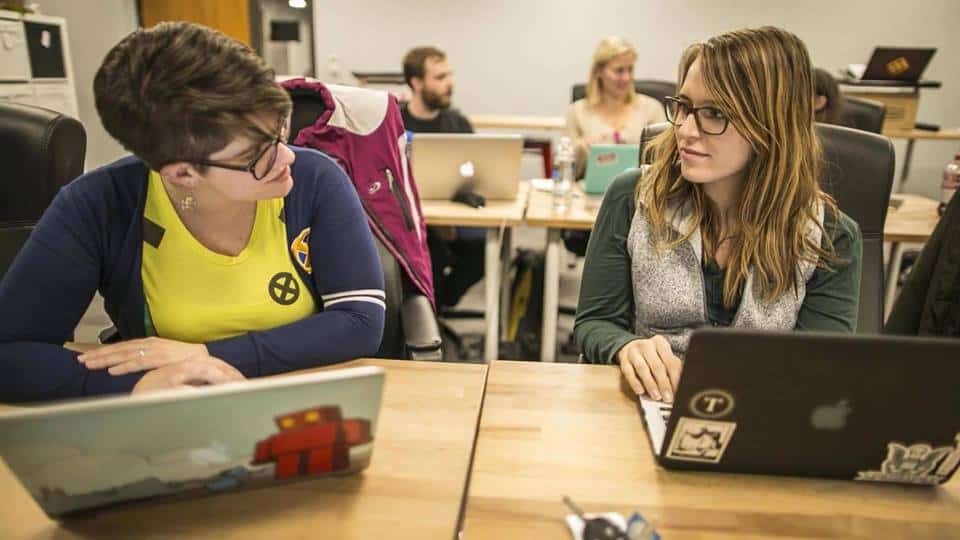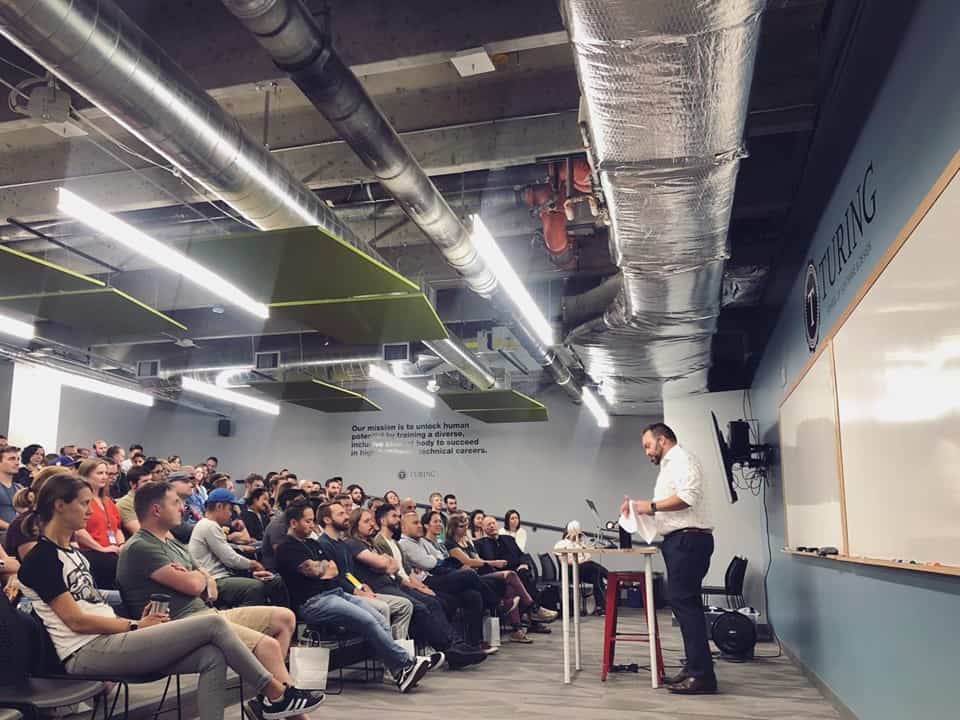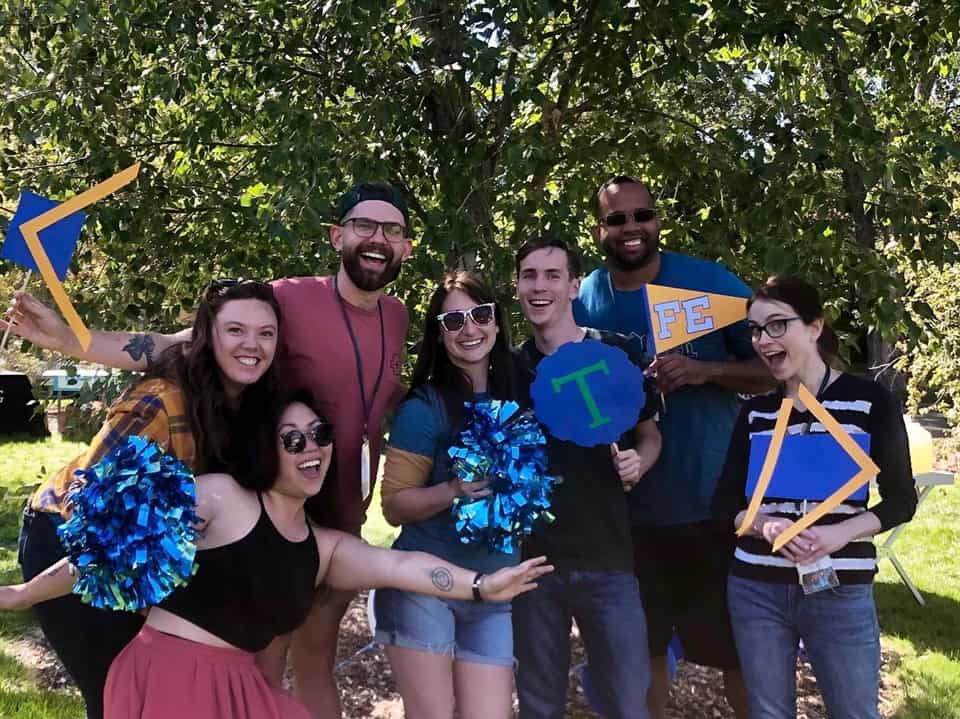
Turing School
Turing School Overview and Guide
Turing School is a full-time software engineering institute based in Colorado. In the last seven years, it has helped over 1,000 graduates launch rewarding careers in tech. The school also received a significant amount of positive reviews online, particularly on how its programs are a good match for beginners and advanced engineers.
But, is Turing School really worth it, or are the programs overhyped? In this comprehensive overview and guide, you will get an unbiased view of the cost, quality, and outcomes of this online coding bootcamp.
What You Need to Know About Turing School
Turing School previously held in-person classes in Denver but due to the COVID-19 pandemic, all classes have been moved online.
- Cost: Full-Time: $20,000
- Schedules: Full-Time
- Courses Offered: Front End Development, Back End Development.
- Upcoming Start Dates: May 10, July 5, August 23
Turing School Curricula: What Can You Study?
Turing School is a good choice for aspiring software developers, offering two main programs that cover the front end and backend aspects of development. The classes are designed to help polish students’ skills by using the most in-demand tools in the industry.
The bootcamp also offers career coaching to ensure students are ready to secure a job once graduated.
Front End Engineering
Front end development involves the ‘client-side’ of an application or a website, which generally means the side that users interact with. In this course, students can expect to build interactive applications by using languages like JavaScript, HTML, and CSS, among others.
The goal is also to train students to be efficient UX/UI designers using programming frameworks and concepts like React and Node.js. Students will need to commit at least 40 hours a week for the duration of the bootcamp.
People with no experience can first opt for the Mod 0 course, which is the prep work that lasts for about 30 to 40 hours and can be completed in one week.
Backend Engineering
Backend engineers work behind the scene to ensure the functionality of an application or a website. Aside from object-oriented programming, other back-end fundamentals will be the central focus of this course. Students will learn how to study and manipulate data structures during the development of database-backed applications.
This course also runs full-time for seven months and requires a time commitment of 40 hours a week. Prospective students with little to zero backend development experience are encouraged to take Mod 0 first.
Turing School Campuses: Where Can You Study?
The headquarters of Turing School is in Denver, but all on-site classes have been moved online until further notice.
- Denver
- Online
Turing Schedules: When Can You Study?
Full-Time
The full-time training programs at Turing School are highly comprehensive. The school expects students to dedicate 40 hours daily for virtual classes and an additional 10 to 15 hours for at-home lessons. Students must score a minimum of 90 percent in attendance to graduate.
Part-Time
Turing School does not have a part-time program. So, if you are looking for a bootcamp that will allow you to work and study at the same time, Turing School may not be the best option for you.
Flex
Turing School may be an online bootcamp, but all classes are instructor-led over video conferencing platforms. Follow the school’s schedule to complete the program.
Turing School Tuition
At $20,000, the tuition is on the higher side. Students also need to factor in living expenses considering the program requires a full-time commitment for seven straight months. The good news is there are several financing options that students can opt for.
Financing and Payment Options
- Upfront Payment. This is the best option for those who would prefer going debt-free. The school accepts payment in cash or card.
- Student Loan. The school does not offer an Income Share Agreement but students are welcomed to apply for a loan that will cover their tuition and cost of living. Turing School has partnered with Climb Credit, Sallie Mae, Training Loan, and Ascent Funding to make this option possible. The terms of borrowing and repayment vary from one company to the other.
- Scholarships and Grants. To promote diversity, Turing School offers two $4,000 scholarships each cohort for students from underrepresented communities. If you are a tech protégé, you can request a grant for the local workforce committee. Students living with disabilities can also apply for Vocational Rehab assistance.
- GI Bill. If you are a veteran or a direct relative of a veteran, you can use the GI Bill to pay off some of your tuition at Turing School.
Turing School Admissions: How to Get In
The admissions process is straightforward and you can complete it online. However, the coding bootcamp is highly competitive.
You must complete every part of the admissions process for the school to consider your application. If you do not get admitted between 40 to 45 days after submitting your initial application, you are encouraged to reapply.
Turing School Application
You can visit the school’s official website to apply. When you click on the “Apply Now” button on the homepage, it will redirect you to another page where you will fill in your contact details.
Apart from your contact details, you also have to submit your resume and fill out the work history section. Even if you’ve never had a tech job, you will still need to fill in the sections accordingly. This is followed by a short logic quiz and a two-part interview.
If you require more assistance, you can also contact a customer care representative from Turing School.
Turing School Interview
The interview process is divided into two parts, just like the first stage of the registration. The first part of the interview is a collaborative logic evaluation, while the second part is a dialogue section.
The collaborative logic evaluation is like any other evaluation that you can take on your own. During the dialogue, the interviewer will have a one-on-one conversation with you. This is also your chance to ask as many questions as you want about the school.
Turing School Admission Rate: What Are My Chances of Getting In?
Turing School does not publish its admission rate. However, only 28 slots are available per cohort.
The bootcamp is open to everyone, but prospective students from underrepresented or other minority groups or have a higher chance of getting admitted. It also helps if you have some coding experience.
Turing School Outcomes: Will I Find a Job?
According to the school, you can find a job within 90 days after you graduate. The official Turing School website says over 900 graduates have secured high-paying tech jobs since 2014.
These graduates earn between $75,000 to $90,000 on their first jobs right after the bootcamp. They reportedly work in reputable tech companies across the globe, not just in the United States.
Job Placement Services at Turing School
Turing School has a job placement rate of 97 percent, with 91 percent of graduates getting jobs as software engineers. Four percent out of the 97 percent received other technical jobs related to software engineering, while the remaining two percent landed technical teaching roles.
The school makes an active effort in making sure that every student is career-ready before they graduate. There are mentorship programs, networking opportunities, and career counseling services that guide students through the job search process.
Should You Apply to Turing School?
Yes, you should apply to Turing School if you want to launch a career in tech as a software engineer. While it doesn’t offer a job guarantee, Turing School has a reliable job placement program.
Combined with the technical skills you will gain, the job placement program can help students reach their full potential even after graduation. However, keep in mind that Turing School currently does not offer other in-demand courses like data science.
- Software Development Specialization: Despite the growing popularity of full stack software development, engineers who wish to focus either on front end or backend engineering need a place to train. Turing School is making this possible by allowing tech aspirants to pick any part of software development that interests them the most. It makes learning more fun and exciting.
- High Job Placement: Turing school may not offer a job guarantee, but it has a high job placement rate, so your chances of getting employed right after graduation are relatively high. This is supported by its excellent track record.
Graduates from other coding bootcamps reportedly earn an average between $60,000 and $62,000. However, graduates from Turing School have reported higher earnings between $75,000 and $90,000 shortly after graduation.
Even if you opt for a student loan, you’d likely be able to make fast repayments considering graduates of Turing School are able to land a job within six months of graduation.
Turing School encourages students to view the cost of their education as an investment in themselves. This is a fact you should consider when you’re looking for the best coding bootcamp for prospective software engineers.
Price Range
$0-$20,000Programs Available
Programs Pace
Financing Options
8 Reviews
Sorry, the comment form is closed at this time.




















Anonymous
Turing was more rigorous than my four years of college combined. The difference I’ve experienced leaving college with a business major vs leaving Turing is when you walk into interviews you can prove that you can do the job or you can translate what you know to perform the job required. That is what I love most about Turing. I will never have to walk into an interview and say things like “I’m a natural leader”, “I’m a real go-getter”, or any other lines that embarrass me just to type. Walking into interviews with many projects that display you can perform the job, on a tight deadline, working with others or independently, and then prove you can solve difficult problems on the fly in a code challenge, is a far superior way to walk into an interview.
If you choose to go this route, be prepared to work very hard, learn constantly, be confused, sandwich successes with many mistakes, work with others, ask questions, grow professionally, and build cool things. Attending Turing will open doors you never considered possible. No one attends Turing alone. You will have tremendous support from outstanding staff, your peers, and an extensive alumni network who all want to see you succeed. Turing has my highest recommendation.
January 15, 2019
Anonymous
To preface, I was installing commercial washers and dryers right before starting Turing, I left that job to start the program. I was very unprepared and had done very little before coding before my first day of class. However, I quickly found that by committing enough time and energy I could learn anything. The staff was incredibly helpful in directing the learning and the classmates really made the difference. There is a bond that is formed with your cohort that is hard to describe, they are your grounding throughout the process and essential to any individuals success. I got a job after an extended job search (solely my fault) and it has been truly life changing. I now make more than double what I previously did and I couldn’t be happier with the direction my life is now heading. I have only Turing to thank for the new skills and tools I now have at my fingertips.
January 20, 2019
Anonymous
I had the luxury of going through Turing as a white guy with a master’s degree and a history of being affirmed in the STEM field. I highlight this to say that my perspective on the challenge of Turing is pretty pure to the work and curriculum itself and not to larger systemic or identity pressures and stressors from things like race, class, gender, education, etc.
That being said, Turing is *really* hard. It really is non stop work for seven months for at least 60 hours a day (and a mellow day at that). The Turing difference is that you develop insane endurance for problem solving and spending all day thinking like a programmer.
I went through the back-end program covering Ruby and Ruby on Rails, but the curriculum and instructors pave a road for students that leads them to a place of very generalizable knowledge that applies to many contexts in software development (almost two years out from graduation, I work on a completely different stack).
Turing helped me completely alter my life trajectory in terms of opportunity and fulfillment. If you want to see what coding is like or if you even like it, don’t apply yet. It’s not a kiddie pool! If you are serious about wanting to become a professional software developer, it is the only slam-dunk option in my mind.
January 23, 2019
Anonymous
I graduated from college in 2011 with a major in Political Science and a minor in “International Studies”, whatever that is.
I have never, ever used the “skills” I gained in college. No one has ever asked to look at my resume, or asked me about my college education.
The skills I gained in Turing, on the other hand, are extremely relevant. I’m now a software developer, and I’m about 1.5 years into my first job.
I suspect my entire working career will fall into two categories:
Pre-Turing
Post-Turing
I’m feeling really good about my post-Turing career. I enjoy the work I do every day, and I’m well paid. I have significant growth opportunity in my career, and I have a healthy work-life balance. I can spend time with my wife and family, friends, etc.
I appreciate what Turing does every day, and contribute time (and money!) to their efforts. I mentor students, I donate to the school, I refer many friends to Turing. To date, FOUR of my friends have gone through the program, and all are equally thrilled with it.
After I finished Turing, I paid off the $15k I owed for Turing, and the $15k I had left in student loans, in less than a year. Now all the extra income just goes straight to savings.
I wrote up a bit about my experience here: https://josh.works/turing-retrospective
I think Turing is a great use of time and money. I strongly suggest you do the work of setting yourself up for success at Turing, across financial and emotional domains. Take out a loan if necessary, but don’t try to work a job while in Turing.
Plan on putting your regular life on hold while at Turing. Work hard to get through the prework, and then some. Work hard, and sleep at least eight hours a day. When you’re done, do what they say to get a job, and you’ll get a job. Your life will be changed.
January 23, 2019
Anonymous
I very much enjoyed my time at Turing and got an amazing new job a little more than a month out from graduating. I considered several different bootcamps and the thing that sold me on Turing was the staff and the commitment to excellence. Turing isn’t the 20th branch of a corporately owned bootcamp churning students and catering to investors. Turing is a single-location non-profit and the founders are down in the basement day in and day out critically analyzing everything they do and continuously improving the curriculum. I’m actually jealous of the current students because I feel like the curriculum has gotten markedly better even since I was there a few months ago.
Turing also has a very good reputation with employers because their graduates are actually job ready. Turing is very hard especially if you’ve never done any previous programming (most students haven’t so its normal). Prep work before starting is crucial to your success in the program in my opinion. They are currently working on Module 0 to help students prepare. As hard as it is, Turing is a lot of fun! The projects are awesome and you will make some really good friends. The camaraderie in the basement is infectious. The teachers are also excellent and very committed to the students.
You will get a job after Turing and a lot of graduates are making really good money right out of school. However, you have to work hard for it and make sure all your ducks are in a row (networking, projects, personal site, interview skills, LinkedIn). The alumni network is strong and the career services people are great. They will help you with all this stuff if you put in the work.
I would highly recommend Turing to anyone who is interested in programming as a career. If you’re not sure, go check out a ‘Try Turing’. If you like it, sign up for the program and start preparing right away! 10/10 would enroll again.
January 24, 2019
Anonymous
Making the choice to go through Turing’s program was one of the best decisions I’ve ever made. It’s hard. That’s no joke. But it’s also a very good program. I did a lot of research into options when I was making this decision, and there were a number of reasons Turing came out ahead for me. Their status as a nonprofit was a big one. Another was the campus. It’s humble. It just has what you need to do the thing, and for me, that was a selling point. It said to me that they are confident enough in the core of what they are doing to let that speak for itself. That assumption was right. The staff is excellent, they genuinely care about every student there. And do their best to help you be successful. I have a new life now because of this program. And it’s a far better life than I came in with. I’m a year out now, and on my second job. For the first time in my life, I love what I do, and I look forward to work. I could not have done any of this without Turing.
January 28, 2019
Anonymous
Making the choice to go through Turing’s program was one of the best decisions I’ve ever made. It’s hard. That’s no joke. But it’s also a very good program. I did a lot of research into options when I was making this decision, and there were a number of reasons Turing came out ahead for me. Their status as a nonprofit was a big one. Another was the campus. It’s humble. It just has what you need to do the thing, and for me, that was a selling point. It said to me that they are confident enough in the core of what they are doing to let that speak for itself. That assumption was right. The staff is excellent, they genuinely care about every student there. And do their best to help you be successful. I have a new life now because of this program. And it’s a far better life than I came in with. I’m a year out now, and on my second job. For the first time in my life, I love what I do, and I look forward to work. I could not have done any of this without Turing.
January 28, 2019
Anonymous
TL;DR: Turing is a fantastic choice that is extremely challenging but ultimately very rewarding. Be prepared, don’t underestimate anything about the process and you’ll be happy with the end result.
I consider attending Turing one of the best decision I’ve made in my life. I spent 10 months in the program and it was extremely challenging. I was by no means a “top” student and repeated modules multiple times. Early on in my time there, I felt like I didn’t have the chops to personally succeed in the program. But I had great teachers and a mentor who really supported me when I’m not sure I deserved it. As time progressed through the program, I made some personal life changes that helped me get to the very end. If you’re considering this program, I’d highly recommend that you do it but with a caveat. Do your best to get your personal life in order. Turing really requires a 100% commitment to be successful. I personally didn’t realize just how much of a commitment it was until weeks into the program. Don’t be like me. Go in there with clear expectations of what it’ll take and you’ll be in a good place mentally. And after spending 7 months or more in the program, you’ll have great fundamentals to jump into a rewarding career in the software engineering industry. You’ll make life long friends and have a great alumni network.
Turing also does a great job at preparing students for the first job interview process. You never really know what that’s going to look like until you actually do one, but I was happy with their commitment to that part of the process.
March 13, 2019